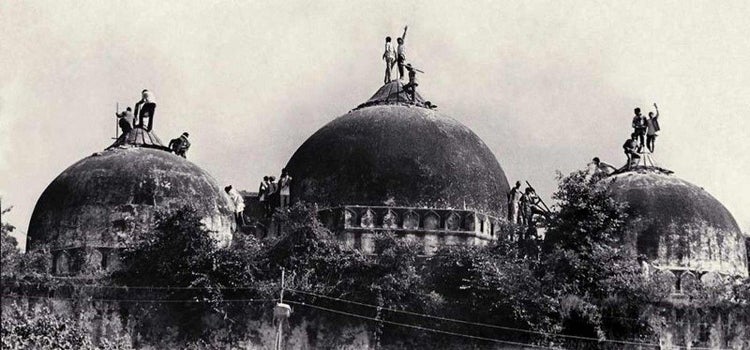From the alcove of oblivion, a memory rises and overpowers me. Babri Masjid was demolished on December 6, 1992. I was not born then. How do you erase an unlived memory?
I have been haunted by the three domes all my life. Finding shelter in the wilderness, I think expansively about the day those three domes were dismembered. My belief in my country shatters when I see domes littered around cities. I sit in the canopy of domes and Google on my phone the pictures of Babri Masjid. My heart starts beating faster, I take my Lord’s name to find my calm.
Bapu (Mahatma Gandhi) took Ram’s name as he died. The utterance of Ram’s name in one’s last moments is said to purge one of all his/her sins.
Those karsevaks also yelled Ram’s name as they demolished the masjid blow by blow.
I first saw the video when I was 11 – I gasped, ‘Oh Ram’, as I saw it unfold.
A grief has lived with me ever since. It was wrong – and not because any law said so. It was wrong as I knew it. The seat of divine authority, as Gandhi said, lies in my heart.
I had not read the preamble yet. It did not matter. The understanding of right and wrong is not a consequence of any institutional education.
Also read: Once Upon a Time in a Land That Was Secular
An era has passed, and there are more militarised soldiers of Ram than his servers and lovers. I have turned seven-years-old as a voter. However, I became political that day. As an 11-year-old, I decided not to miss another event in the life of my nation. I missed a lot by not being born.
I also became religious that day. My maharajji, a local saint and our guru, whispered into my ear, “I seek your refuge, Lord Ram” and initiated me in the tradition.
But who is this Ram that I am constantly bothering to help me find a lost key, for delaying a geography test, for healing me from a bout of typhoid? I had to figure it out.
Maithili Sharan Gupt, in his seminal poetic work Saket, asks Ram, “If you are a human, aren’t you God then? Aren’t you embedded everywhere in the world?”
Kabir says that Ram is more than the name of a mythological character. I knew the name of Ram before I knew many names. In inexplicable ways, the name kept me together.
It was bewildering to me that in the name of a name so eternally true, why would one break stones? Why would anyone limit his name to one site?
My Ram grieves in me.
Thus, I began my experiments with religiosity. I would sit in masjids and say, “I seek your refuge, my Ram.”
My belief in shared religiosity and sacred spaces only intensified. Ram transcended boundaries and so did I. However, Ram could not escape his own tragedy, so how would I escape mine? But finding strength in his name, I have remained a religious person without being pulled into sectarianism. I would frequent masjids and dargahs and churches and gurudwaras with an experienced familiarity and not with any sense of otherness. I would revel in our plural expressions of religiosities.
To know Ram in your heart and find him all around, that was the joy.
But when I saw blood being spilled in his name, I wanted to fill the world with shrill questions, “How could you claim Ram’s name, his identity and yet be oblivious of his values, his tragedy, his imperfections?”
I look at the blue and red board detailing the punishments for causing any harm to the buildings protected by the Archaeological Survey of India outside monuments for a while before I enter them.
I see a dome here and there and everywhere and I think of those three domes. The demolition of the Babri Masjid has played a role again and again in my life and renewed grief became my companion. I would read a book and Babri Masjid would be demolished again, I would watch a movie and I would see Babri Masjid falling to its ruin, I would read a poem and see those domes being brought down yet again. For me, the timespan between the Allahabad high court judgment and Supreme Court judgment, Babri Masjid was like one of the questions in examinations that I didn’t know the answer to; like something that is broken and cannot be put back together.
It discomforted me and yet I got used to the discomfort – there was a Babri Masjid inside me too that had been demolished. I had made my peace with the ruins.
But unbridled arrogant power does not even let ruins be.
Shraddha Upadhyay is a lawyer and Young India Fellow. She currently works as a Research Associate with IIM Ahmedabad.

